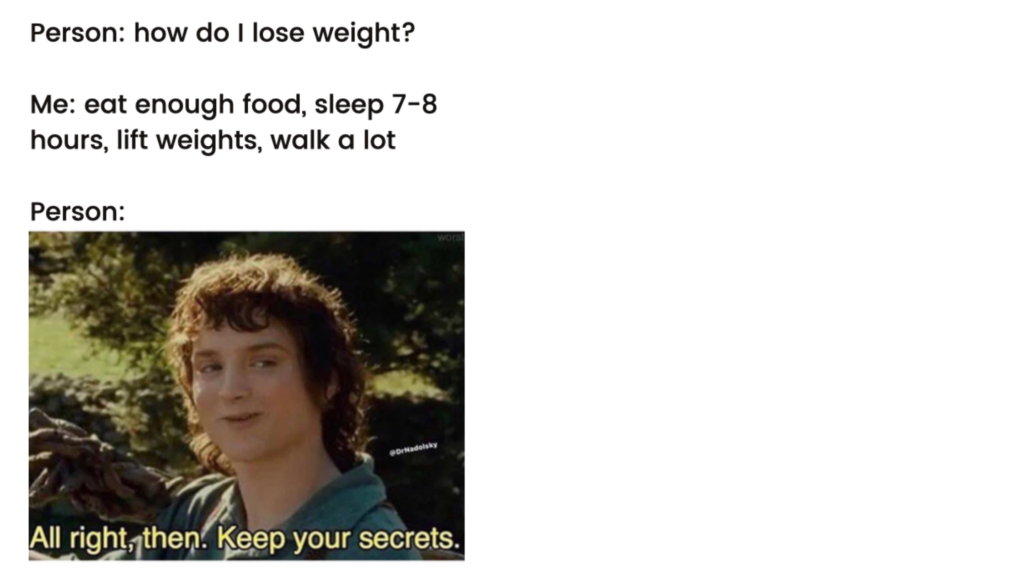Without knowing anything about you, I’m going to be bold here and tell you why you’re probably not losing weight.
Well actually, it could be for 2 reasons.
- You’re eating too much
OR
- You’re not eating enough
So, how do you know which one it is?
I can honestly say that there’s probably a 90% chance that you’re someone who is not eating enough, and it’s the biggest reason you’re not reaching your weight loss goals. I talk with so many women who don’t realize they are undereating!
Why are so many of us women undereating in the first place?
Well, does it really surprise you? Many of us grew up in eras where substituting a shake for a meal was recommended. We were told that skipping breakfast was a good thing. And worst of all, our doctors kept telling us to watch our calories and increase workouts to lose weight.
If you’re new around here, let me be the first to tell you that decreasing your calories is not our method for weight loss, and it’s actually the proven worst way to support your metabolism long-term.
What do we recommend instead? Increasing your metabolism instead of decreasing your calories! I’ll speak more on this below.
If you think that you’re a person where eating too little is definitely not the issue, I see you! Eating too much can occur for so many reasons, but first, let me tell you that it doesn’t mean you’re a bad person. Some common culprits include unmanaged stress and emotions, unbalanced blood sugar, or heightened cravings. Check out some of these blog posts that further address these with recommendations to stop them in their tracks!
- Stress management strategy
- How to curb emotional eating
- Blood sugar management
- Chronic stress & adrenals
Why you need more food for weight loss:
Okay, let’s circle back to the biggest reason I see women struggle with their weight loss goal: not eating enough food. But the pattern ends now!
It’s tempting to eat in a large calorie deficit because it often leads to fast weight loss *at first*, but it totally TRASHES your metabolism behind the scenes and makes weight loss harder and harder the longer you go.
Why does this make weight loss harder over time? A decreased metabolism means you burn fewer calories overall in a day. And this means you have to eat fewer calories just to maintain your new weight. If you return to the amount of food you were eating before you started cutting calories, you’ll gain weight and probably in a surplus. This absolutely sucks.
SO, instead of attempting weight loss by eating less and less food which will eventually screw you over, I want you to think about supporting your metabolism and eating enough food instead.

What do I mean by supporting your metabolism exactly?
At myDietitian, we teach our clients that metabolism is a lot like an ecosystem. You can’t put all your energy in one area and hope the rest gets its act together. It’s a fine balance.
Well, it turns out that the whole ecosystem big picture is definitely going to act out if you’re not providing enough fuel in the first place.
You can’t build muscle to increase metabolism without eating enough calories.
You can’t have good gut health without eating regularly or enough fiber.
You can’t be resilient to stress without getting enough nutrients.
You need enough food, sis!
“Won’t I gain weight if I eat more food?”
If you increase how much you’re eating drastically overnight, well yeah, probably.
But I don’t want you to do that. I want you to slowly make changes so that you’re eating nourishing meals with plenty of protein, healthy fat, and fiber.
You’re swapping out a restrictive mindset for a “what can I add to my plate?” mindset. Can I add more fiber? More color for micronutrients? More protein for satisfaction?
Our rule of thumb for what we call PHFF meals includes:
- 20-30g of protein
- 10-30g of healthy fat
- 5-15g of fiber
This is a flexible structure that gives you a guideline so that you leave meals satisfied, turn off hunger hormones, and give your body the fuel it needs to keep a high metabolic capacity.
So, yes, I’m basically saying you can eat more food AND have a revved metabolism with PHFF. It’s amazing.
And remember, you’re SLOWLY making these adjustments. This is not a switch you make overnight. Your metabolism will slowly get the hint that you’re providing consistent and adequate nutrition moving forward.
This means your body is safe and supported enough to grow muscle tissue, burn fat, and, overall, do more when you’re at rest. This can’t happen when you’re stuck in a large calorie deficit, and it’s why so many women struggle to burn fat.
You can also think of your metabolism like you think about your gas tank in your car. You don’t expect to make it 300 miles on your road trip by filling it halfway. Why do we think we can go about our normal day AND burn fat on top of that by adding less fuel to the tank?
And further yet, when we consistently fill our gas tanks half full over a long period of time, shortcuts have to be made, and this means your metabolism downregulates. Your body has to adjust to the consistently low fuel gauge, so it gets really good at preserving energy instead of burning it. This equates to your weight loss plateau despite your hard efforts!
“How do I know if I’m not eating enough food?”
While I can’t give you a specific answer without being your coach, I will give you a list of questions that can help you figure this out for yourself:
- Are you able to go 4 hours between meals without getting hangry or thinking about food constantly?
- Do you have uncontrollable cravings?
- Do you have afternoon fatigue daily?
- Do you have regular bloat and/or constipation?
- Do you have trouble concentrating or constantly feel brain fog?
- Do you have low energy or desire to exercise?
- Do you have extreme muscle soreness after workouts?
- Do you have poor sleep quality?
- Have you been watching your calories for a while and not seeing any changes?
- Are you eating ~1200-1500 calories a day?
While saying yes to any one of these alone doesn’t automatically mean you’re not eating enough, these questions are helpful when assessing your current situation.
If you feel like you have some work to do in this area and want to slowly turn things around, here are some questions to start asking yourself:
- Do I feel satisfied after this meal? If not, can I add more protein, fat, or fiber in some way?
- Am I ignoring a hunger signal at any point in the day? Can I make time to stop and eat? Can I be more intentional with my meals/snacks?
- Am I limiting my meals to a certain amount of calories vs. allowing myself to be satisfied?
- Am I letting myself get too hungry at any point in the day? Should I have an intentional snack before a certain meal so I don’t get too ravenous?
- Do I overeat at night? Am I eating enough at dinner?
Notice how none of these questions have to do with tracking your food. While we completely advocate for awareness and intention with nutrition, monitoring every morsel you eat is not a strategy our team recommends for long-term success. Your body has built-in calorie counters (our hunger hormones) that are totally trustworthy when you take the time to listen. Your hormones have your back!
I hope this was helpful and gets you on the right track for healthy weight loss.
Remember: you can’t have a rocking metabolism without enough food!
Coach Elle

Enjoyed this article? Get more Nutrition 101 delivered straight to your inbox.
Unlock your best you.
Get daily nutrition you can count on with plans that work for your body.
Start today
Contact Us
Home
About
Why Us
Nutrition 101
© 2025 MyDietitian | All rights reserved | Privacy Policy
Connect
Join Our Newsletter